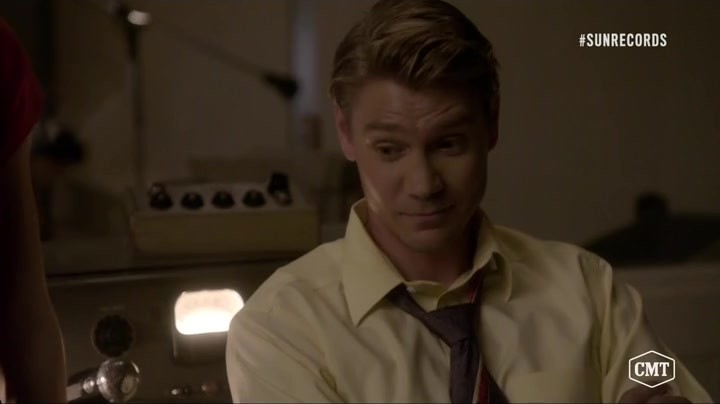In week two of Sun Records, the sprawling scope of the story is starting to weigh the show down, and the limitations of the format are becoming obvious.

“Outta The Groove” opens with the final character introduction of the Million Dollar Quartet: a teenage Jerry Lee Lewis roaming the streets of Ferriday, Louisiana with his cousin Jimmy Swaggart. Jerry Lee and Swaggart are played by identical twins Christian and Jonah Lees. The jobs makeup and wardrobe have done in making them look like they’re related, but not twins, is an object lesson in the power of the two crafts. Later, when the two are banging on an upright piano in Jerry Lee’s home, Christian nails Jerry Lee’s bug-eyed mania. I’m interested in seeing more of the character, but Jerry Lee gets so little screen time in this episode I question the need to introduce him at all.
Back in the Sun lobby, Sam and Marion are getting themselves back together after a night of illicit carnal enjoyment. I’m increasingly impressed with the performance of Margaret Anne Florence, a veteran of both 30 Rock and Inside Amy Schumer. Even though her non-sexytime role in the studio storyline is to introduce inconvenient exposition, she shines in all of her scenes. Sam’s attempts to hide the affair are comically lame, and the climactic scene of the episode is a bait and switch where Becky Philips seems to be confronting Marion about the affair, but instead thanks her for her dedication to building Sam’s dream. Isolated in the Sun lobby, the two most prominent women on the show pull off the classic soap opera move with aplomb. But the scene also exposes something profound about Sun Records: It’s essentially Nashville dressed in 1950s Memphis drag.
On the one hand, it’s obvious why. Empire, the great late night soap opera of our time, continues to ride high in the ratings, and CMT wants a Knots Landing to go along with its Dynasty. But it’s also frustrating. Sun Records is, could, and should be about the humble genesis of the American pop cultural juggernaut. The meat of the story is how the mom and pop music business transitioned into the world-spanning sound of empire (or at least hegemony), and how a bunch of weirdos from the sticks’ schemes blew up beyond their wildest dreams. Those elements are there, to be sure, but at this point I’m skeptical that a history story filled with colorful characters and incredible music can make a good framework for melodrama.
Case in point is Elvis’ storyline. Sure,we need to boil down a lot of elements of Elvis’ not-so-eventful teenage life into a few scenes, but the “going to a black church” narrative—something which simply didn’t happen—doesn’t accomplish anything more than the actual truth would have. Elvis was exposed to black music in the record stores, on the radio, and on Beale Street. He wasn’t popular at school not because of any rubbed-off racism, but because he was a poor, shy mama’s boy. There’s plenty of fodder there for both teenage romance melodrama and Jim Crow South world building, so the writing choices here are baffling.
Sam Phillips story is better in this respect, and in episode two, we get to see director Roland Joffé’s version of the immortal beat making scene from Craig Brewer’s Hustle and Flow. Phillips gets B.B. King in the studio rearranges a song on the fly. Although abbreviated and simplified (hey, it’s TV), the scene gives a good sense of how Philips’ worked, pioneering the still unsung and misunderstood role of the music producer. B.B. is played by Castro Coleman, an International Blues Challenge winner from McComb Mississippi who doesn’t even have an IMDB page yet. Coleman looks the part and displays confidence as he shares the screen with the manic Chad Michael Murphy.
Sam’s skills and the intimate connection with his dark side is this episode’s most successful storyline. If I’m going to fault Sun Records for historical inaccuracy, I’ve got to give the show credit for its unflinching treatment of drugs. Rock and roll was always amphetamine music. During World War II, amphetamines, a relatively new chemical compound, were widely used by soldiers and airmen on all sides. Aircrews got hopped up on speed to fly long missions, and introduced their ground crews to the drug. When the mechanics who kept the planes flying during the war demobbed, they took the drug with them into civilian life. Benzadrine, the first and most common amphetamine, spread illicitly through truckers and biker gangs. Touring musicians took it up for the same reasons truckers did—it helped them drive all night from one gig to another. When bluesmen took speed, they played faster, a rock and roll was born. The motormouth Dewey Phillips is the show’s amphetamine avatar, and he’s a bad influence on Sam. The two of them cutting their bennies with whiskey outside the Bon Ton Cafe is probably the most historically accurate thing on the show so far. Speed plays a role in both Sam’s greatness—his uninhibited, early morning underwear dancing that embarrasses Becky in front of the neighbors—and his darkness—the 4 AM amphetamine psychosis that warrants a Becky intervention.

Johnny Cash’s time Lackland Air Force Base in San Antonio is represented by a pair of sequences at Skateland, giving Kevin Fonteyne an opportunity to schtick it up on skates and meet cute with his to-be first wife Vivian Liberto (Nashvillian Anna Grace Stewart). The Skateland scenes, which feature some excellent cinematography courtesy of the rink’s disco ball, highlight once again the superb job the behind the camera crew is doing. Col. Tom Parker’s comic relief storyline with Eddy Arnold and the suits at RCA Records in Nashville give another opportunity for our criminally under-photographed city to shine. Monroe Avenue and the Exchange Building stand in for Nashville, and they look fantastic, and the Citizen Kane shot where Parker reveals his bluff to Arnold is the best looking image in the entire series so far.
On the acting front, Billy Gardell’s Tom Parker remains the most fully realized character, and once he and Drake Milligan’s Elvis get together, I expect some sparks to fly. But we’re not there yet, and in episode 2 Sun Records struggled to advance the sprawling storylines. This is a common problem on contemporary TV, exemplified by the one-too-many subplots plague that afflicted Game Of Thrones’s later seasons. GoT’s solution to the problem was simple: When someone’s story gets too boring, simply lop off their heads, or burn them at the stake, or flay them, or have them eaten by ice zombies or… well, you get the idea. Sun Records can’t avail itself of this remedy, and episode two, while it contains much promise, shows the strain.